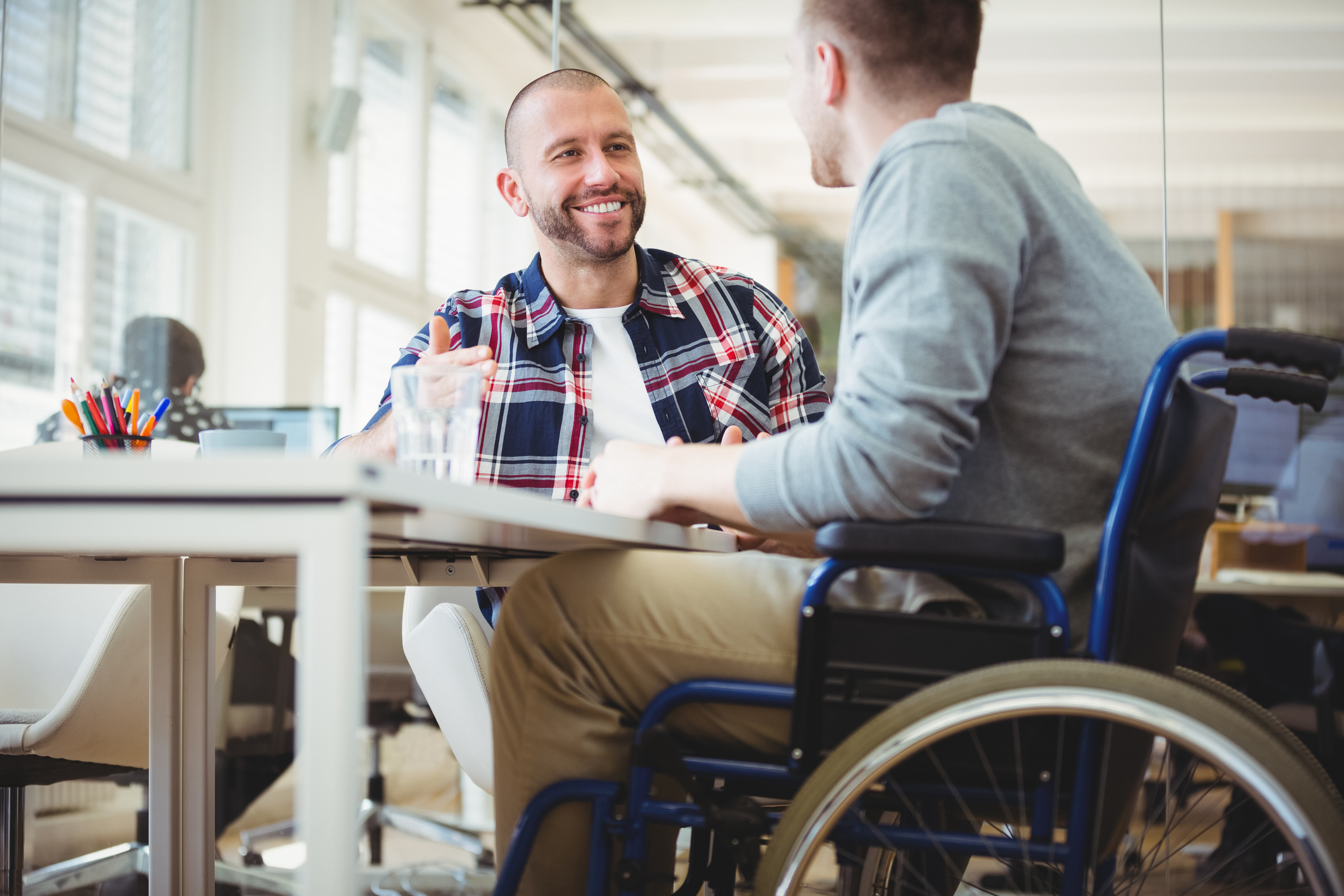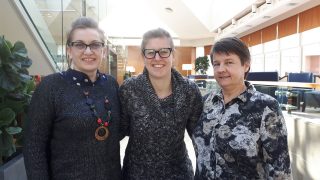Can people with Duchenne be in charge of their own lives?

Progress in health and social care in European countries is helping many boys with Duchenne muscular dystrophy (DMD) to extend their lives beyond what was once dreamed possible, and to take control of their lives as they grow up and become men.
But this story is not shared by everyone in Europe – while some countries provide help to support ‘self-determination’, other countries are lagging far behind on even basic healthcare needs.
I spoke to three women with an interest in Duchenne from three different countries – Romania, the Czech Republic and Switzerland – at a recent meeting in Rome organised by Duchenne Parent Project Onlus, an Italian organisation supporting scientific research for Duchenne and Becker muscular dystrophy.
[caption id="attachment_39096" align="alignnone" width="475"] L-r: Isabela Tudorache from Romania, Marie Sediva from the Czech Republic and Katrin Hasler from Switzerland.[/caption]
L-r: Isabela Tudorache from Romania, Marie Sediva from the Czech Republic and Katrin Hasler from Switzerland.[/caption]
They shared with each other their experience of living with Duchenne, together with their views on how to improve lives of people with the condition across Europe.
Romania
There is no question that healthcare differs greatly across the European Union’s (EU) 28 Member States, with great disparities not only in funding, but in medical practices and in patients’ access to information.
In the 11 years since it joined the EU, Romania has seen rapid economic growth, but is still one of the continent’s poorest nations. This is reflected in its health spending, which is the lowest as a percentage of GDP in the EU, at just 5.1%, far below the average of 8.56%.
This lack of funding creates all kinds of healthcare problems for Romanians, but this is particularly severe in rare diseases: patients and their families must fight for diagnosis, basic treatment and equipment such as wheelchairs.
Isabela Tudorache is from the city of Craiova in Romania and is the mother of Petru, who is now 20 years old and who was first diagnosed with Duchenne at the age of 3.
She says the outlook for Petru would have been bleak, if it wasn’t for the help provided by the Parent Project Muscular Dystrophy charity. Isabela says the organisation transformed the prospects for Petru and other boys with Duchenne in Romania.
“I was very lucky to come into contact with Parent Project USA, and they introduced me to research on corticosteroid therapy for Duchenne. The evidence shows it helps maintain muscles in these boys, and that helped me convince doctors that Petru should get the treatment.
“That was 15 years ago, when Petru was just 5 years old, and he became the first boy to be given corticosteroid therapy in Romania.
“Our doctors were very sceptical at first: they said it was like giving poison to a child. However, in time, they saw that Petru was able to keep walking and stay in good health; it has helped him enormously.”
She says other doctors in Romania are surprised at how healthy he is. “He’s not what they expect, because having Duchenne in Romania was like having a death sentence. The belief was that Duchenne boys will die at 14 or 15, or maybe get to 20 if they’re really lucky. But Petru is happy to be proving them wrong!”
She says the input from Parent Project opened a window to the wider world for the medical profession in Romania. Isabela and other volunteers worked hard to translate medical literature, and to show them what was happening in conferences and in research in the leading nations.
The Czech Republic
Thankfully, the levels of medical knowledge and research are more advanced in the Czech Republic, which has three specialist treatment centres to help Duchenne patients.
Marie Sediva is a paediatric neurologist undertaking research on boys with the condition at one of these specialist neuromuscular centres in Prague.
There are around 200-250 children with Duchenne/Becker in the Czech Republic, with more than 60 visiting the Prague centre.
Marie sees signs of progress in treating DMD – the Prague centre was built from scratch by an inspirational doctor, Jana Haberlová, who is determined to improve care for children with neuromuscular conditions.
“I feel very lucky to be starting my career in medicine at this time, when there are lots of new medications, and lots of new therapy possibilities are being created,” says Marie. “There is still more we can do for these patients, but things are improving, and it’s kind of amazing to work in this field just now.”
The centre undertakes its own clinical research on the health of patients, and also participates in clinical trials, including an ongoing one of an exon skipping drug treatment. Marie says the medical staff are trying to offer as many possibilities as they can to patients.
“One of the biggest challenges at the moment is personnel – we don’t have enough people to do the work. That, combined with limited funding, means we don’t have someone dedicated solely to oversee clinical trials, for instance.”
She says care for DMD patients must be complex. “For example, many have psychological difficulties, endocrinological complications, abnormal findings in urine, and obviously heart failure or difficulty breathing, so that is something we have to address as well.”
Switzerland
Katrin Hasler is a physiotherapist working in Switzerland and says she has seen huge progress in the length and quality of life for Duchenne patients in the 15 years she has been working with them.
Katrin’s centre in Zurich is the only specialist centre for Duchenne and other neuromuscular disorders in Switzerland, integrated into a network which helps to continually raise standards across the country.
She says this specialist expertise helps boys and their families deal with their slow but (currently) inevitable decline in physical function.
“It’s a big, and very difficult, transition for a boy to go from walking to then depending on a wheelchair, and then eventually on to needing round-the-clock help,” she says.
“So our treatment is of course tailored to their needs. For the older patients, they are fully grown adults, and they have the possibility of working in our centre and trying to live as normally as possible, being active and being social.”
Katrin and her multi-disciplinary team help the patients to maintain physical function in their arms for as long as possible, to keep their hearts and lungs healthy, and to help them adapt their homes and environment so they can be as independent as possible.
‘Powerchair Hockey’ is a fast-growing disability team sport in many parts of Europe and allows people with Duchenne to participate rather than always sitting on the side lines.
“I’m optimistic about how we can keep improving the lives of people with Duchenne. Our oldest Duchenne patient now is 45 years of age. And yes, they can determine for themselves how they live their lives.
“Competing in wheelchair sports is a good example of how these boys and young men can overcome their limitations and participate in wider social groups, which really adds so much to how they see themselves and their lives.”
Hearing about how advanced Switzerland’s care has become is an eye-opener for Isabela.
“Listening to Katrin talk about self-determination in boys with Duchenne is remarkable…that’s a concept I can barely understand. I personally have to care for my son 24 hours a day, as do many parents I know in the same situation in Romania. To hear about the six centres in a small place like Switzerland – that’s amazing. In Romania there are around 600 people with Duchenne and we have no such centres. That’s a big problem.
“It’s a huge discrepancy when you consider that it’s just a two-hour drive from Romania and Switzerland. I would love to see the European Union do something to raise standards in public health across Europe. It’s heart-breaking for me to know that it would be possible for my son to be independent in Switzerland, and yet he can’t be in Romania. So, we have a lot to do to bridge those gaps between these EU countries at least.”
Isabela wants to see far more investment in research and specialist centres in Romania and hopes pharma companies and other research organisations will start to treat it like any other European country.
Petru's perspective
To conclude the article, it seems fitting to leave the last word to a patient – in this case, Petru. Here he talks about how he has learned to adapt as his disease has progressed, finding new interests, friends and activities.
“From time to time, I ask my mum, is there something new for me, a new treatment?
Otherwise, I am happy in ‘my own universe’ – that’s my circle of friends who I play games with online and chat to in forums.
“Growing up, the most difficult thing was not the disease itself, but the fact that I had to rely more and more on others the whole time, and that I couldn’t go out with my friends and be like them.”
Petru’s old life was shut off to him once he needed a wheelchair, so he has had to make a new life inside his house, with his family, his dog, his cat and his online friends, who come from all over the world.
“You could say my circle of friends is bigger now – I talk to people from America, the Philippines, Egypt, the UK and France every day. Many of us have got the same condition, so we talk about life, what we like, what our problems are: classmates, family, girlfriends, everything!”
“Sometimes I might be the only disabled person in the group, but that doesn’t matter online. You just need to find people who share the same interests as you, play the same online games, and who can laugh at life in the same way. Having friends like that gives you a place in someone else’s life, and that always feels good.”
This article is part of a DMD Spotlight series produced by pharmaphorum in conjunction with Santhera Pharmaceuticals
Other articles in this series:
Duchenne's disease: A New Hope
Further information can be found at:
Parent Project Romania
United Parent Projects Muscular Dystrophy (UPPMD)
Center MEH (Mathilde Escher Heim)











